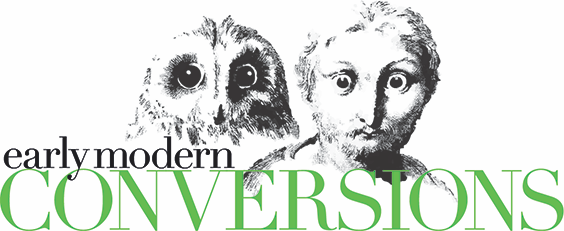University of Michigan
May 3-24 2016
Seminar leaders:
Steven Mullaney, Professor of English, University of Michigan. Author, most recently, of The Reformation of Emotions in the Age of Shakespeare (Chicago, 2015), among numerous other publications.
Paul Yachnin, Tomlinson Professor of Shakespeare Studies, McGill University. Editor of Forms of Association (UMass, 2015) and Shakespeare’s World of Words (Bloomsbury, 2015), and many other books and essays.
The Spring Research Seminar is sponsored by Early Modern Conversions: Cultures, Religions, Cognitive Ecologies, which is headquartered at the Institute for the Public Life of Arts and Ideas, McGill University, and funded by the Social Sciences and Humanities Research Council of Canada.
The Seminar will be hosted by the University of Michigan’s Institute for the Humanities and culminates the Institute’s “Year of Conversions.”
Ben Jonson’s 1614 play Bartholomew Fair ends with the conversion of a puritan into a playgoer. “Be converted, I pray you,” says the puppet-master Leatherhead to “Rabbi” Zeal-of-the-Land Busy, “and let the play go on.” “Let it go on,” says Busy, “for I am changed, and will become a beholder with you.” At least since Augustine’s denunciation of theatre as a kind of anti-conversion, theatrical play-acting and religious conversion have seemed like mighty opposites. Might there be other ways of thinking about theatre and conversion? How in fact are theatre and conversion related to one another? To what degree are they opposed or even mutually destructive practices, to what degree dynamically interrelated kinds of transformation?
In this research seminar, we study theatre, theatricality, and conversion in early modern Europe and its worlds. We make the questions even more challenging by opening up what counts as conversion. Religious conversion is one kind within a field of interrelated variant forms that includes geopolitical reorientation, material transformation, commercial exchange, literary translation, class and sex change, and human-animal metamorphosis. We ask, how did the theatrical forms of conversion translate the horizon lines of knowledge and experience for early modernity, and how did theatre and theatricality integrate, critique, and enable forms of conversion? Are there aspects of theatricality and performance that depend upon an economy of conversion—actor into role, audience into participants—regardless of, or in addition to, the capacities of theatre to represent moments of conversion on stage? How do Protestant forms of drama compare to the dramas of conversion familiar to the Catholic stages of Spain and the Americas?
The Early Modern Conversions Spring Research Seminar welcomes applications from researchers in any of the disciplines represented in the project (Architecture, Art History, History, History of Consciousness, History of Philosophy and Science, Literary and Theatre Studies, Musicology) and researchers who have in hand projects on theatre, theatricality (including street performances, state and city pageants, kinds of ritual, and so on), and forms of conversion in early modern Europe and its worlds (including the Americas, Africa, the lands of Islam, and the East).
Application:
Dissertation-stage PhD students, postdocs, and junior faculty (tenure-track and not tenure-track) are invited to apply.
Travel and accommodation will be provided by the Early Modern Conversions Project. At the end of the seminar, participants will participate in the annual team meeting of the Early Modern Conversions Project, in Ann Arbor, May 25-27 2016.
Ann Arbor offers rich resources for study. The Harlan Hatcher Graduate Library is among the top ten largest collections in the United States. Original home of JSTOR, PROQUEST, and other early participants in the digital era of scholarship, the Library is also a member of the Google Book Project and makes many of its bound volumes available through the Hathi Trust system.
Applicants should send a cover letter, CV, research proposal (max 5pp) and article-length writing sample to conversions@mcgill.ca by January 15 2016. Two confidential letters of recommendation should be sent to the same address by the same deadline; referees are asked to indicate the name of the candidate in the subject line of their email.
Click here to download a PDF of this call for applications.

